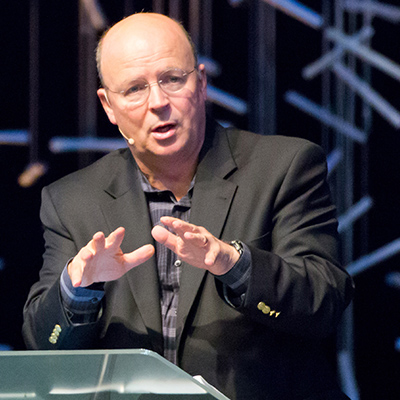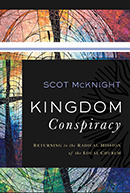
New Testament scholar Scot Mcknight says “kingdom” is the biblical term most misused by Christians today. He plans to set the record straight. – Image courtesy of Scot McKnight
A few years ago, New Testament scholar Scot McKnight had grown irritated with the overuse and misapplication of the word “Gospel” by many Christians. He gave a lecture on the matter entitled, “Did Jesus Preach the Gospel?” in which he said, “When all words mean the same thing, no words mean anything. When the “Gospel,” which is the favorite word for people to use today, means everything, it loses all meaning.”
McKnight might as well have been talking about the word “kingdom,” which he says is the most misused Bible term today. He’s written a book, “Kingdom Conspiracy: Returning to the Radical Mission of the Local Church.” In it, McKnight argues that “kingdom” has “taken on meanings that are completely at odds with what the Bible says.” Here we discuss how Christians have misunderstood the term and why he thinks it is important that they get it right.
RNS: Define “kingdom” in a sentence.
SM: The people of God living under God as king, both in his saving and governing relations, by embodying and obeying the king’s will in the place God calls them to live.
RNS: You address two competing visions of the Kingdom today among “skinny jeans” and “pleated pants” Christians. What are they and how do they fall flat?
SM: The “skinny jeans” view focuses on kingdom as social activism in the causes of justice and peace. The “pleated pants” view focuses on kingdom as redemptive moments with three moments at the top of the list: evangelism, healing or miracles, and influencing various spheres of society.
There are five elements of the term “kingdom” in the Bible: for there to be a kingdom (God’s kingdom), there must be a king (God, Christ), a rule (God rules redemptively and by governing or lordship), a people (Israel and the church), a law (Torah, the teachings of Jesus and life in the Spirit), and a land (holy land expands in the pages of the Bible.).
Both skinny jeans and pleated pants folks reduce the kingdom to less than the full five. The skinny jeans crowd focuses on the law – and focuses that on justice and peace. The pleated pants crowd focuses on God as redemptive king, so it focuses on elements of redemption in the Christian life: evangelism, healing, and influencing the public sector. Sadly, neither focuses on the kingdom as a people.
RNS: Give me the most damaging myth about the kingdom that is popular among American Christians today–in a sentence.
It is a myth to contend that the kingdom and the church do not overlap or that they barely overlap.
We have lots of folks today who want to “sanctify” or “find ultimate approval for” what they do as a vocation – engineering, artistic creation, building water wells – and the word “kingdom” has become the word of choice to give those noble vocations an ultimate justification. I too want those acts to be seen as good and proper for a Christian, but that is not how the Bible uses the term “kingdom.”
Open your Bible and you will see throughout the Old Testament and into the New, and then skip around in the Jewish sources like Josephus and you will see that the natural equivalent for “kingdom” is “nation.” That is, kingdom is a people under a governing and saving king. That people is Israel and the church.
RNS: How much does this really matter? Is this just something seminary professors argue about or does it have practical implications for the way Christians live?
SM: Here’s what matters: hordes of American Christians are far less committed to their local church because they are committed to doing “kingdom work.” Kingdom for many means the bigger things God is doing in this world. A proper kingdom theology leads people to the middle of the church, not away from it. So it makes a difference when church is on the decline and people are saying they are committed to the kingdom but not so much to the church. [tweetable]You can’t have kingdom without church.[/tweetable]
What you are doing for the common good should first be done for those in your local church fellowship. Let’s start there, and we’ll have a fellowship revival worth talking about.
RNS: You’ve had some public disagreements with some in the “New Calvinist” camp. How do you think their understanding of the kingdom is off?
SM: My read is that most of them are Kuyperians, and that means they see “kingdom” as close in meaning to “God’s common grace” at work in the world. So they do “kingdom” work by “culture-making” (to use Andy Crouch’s well-known expression) and they see church as but one “sphere” (a technical term for Kuyperians) in God’s much larger kingdom. I totally disagree that the Bible means “common grace” by kingdom.
To the Kuyperians I say this: there is no such thing as a Kuyperian in the early church. That theory arose in a pluralistic European world when the former dominant culture (church) was losing ground. I acknowledge the realism of the Kuyperian approach and its many gains but I want to place into the center of the picture the church.
RNS: What do you say to people who counter that all this talk about “kings” and “kingdoms” and “reigning” sounds a bit triumphalist?
SM: The issue is how “kingdom” is understood when it comes to Jesus, and a big theme in my book is that [tweetable]the character of the king determines the character of the kingdom and its citizens.[/tweetable] As Hitler’s ruthlessness determined the character of his henchmen and too many of its laws and acts, and as apartheid’s oppressive leaders determined the ways of life for Africans in South Africa, so a king’s or leader’s character shapes the people.
Any kingdom-as-church that is imperial or triumphalist is not living under king Jesus.







